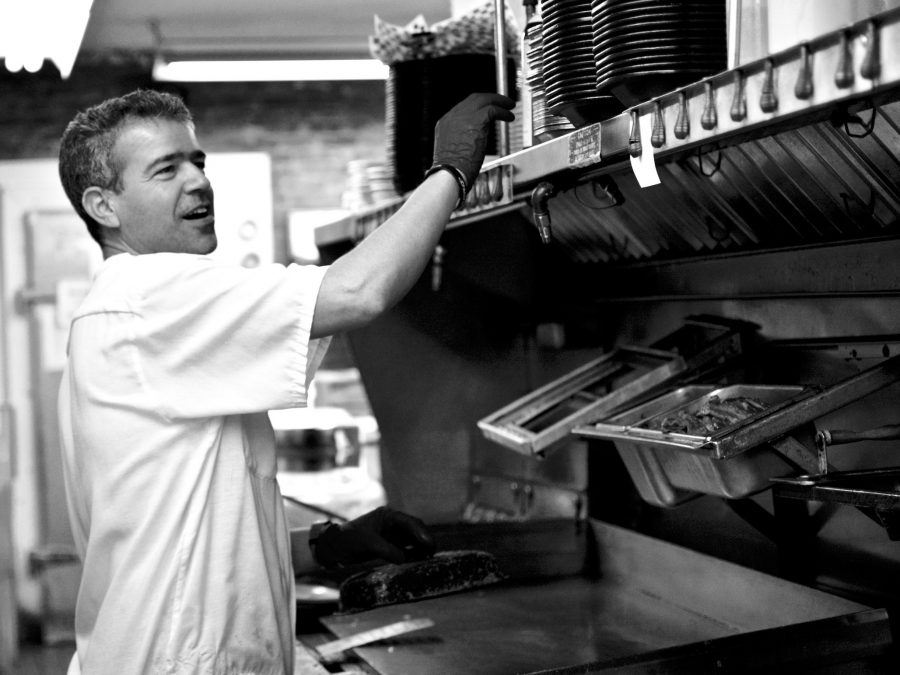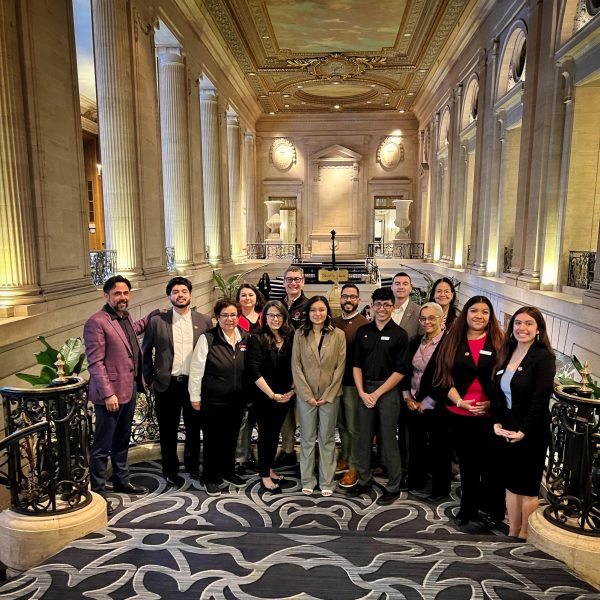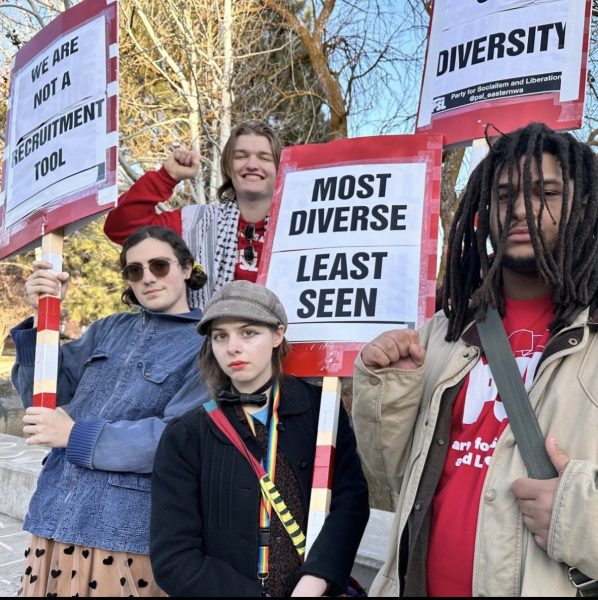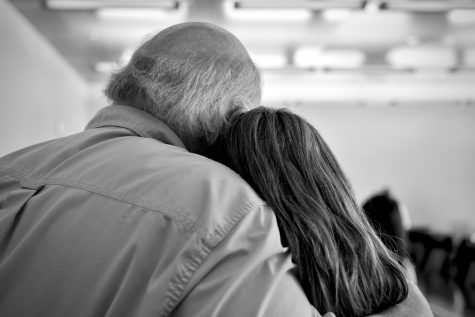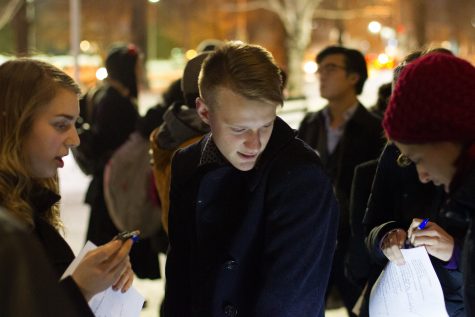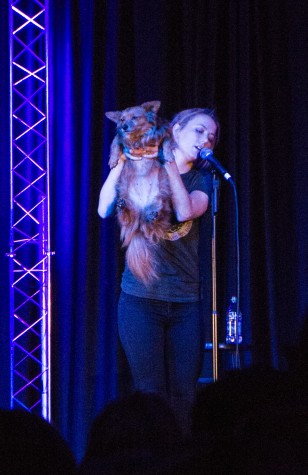King of Cooks
Long-time cook at The Palace Café reflects on humble beginnings and his personal journey to Ellensburg
Ahmed El Kabouss walks through the sliding glass doors of Safeway to the customer service counter.
He’s a slender, well-kept man of Moroccan descent. He has bushy eyebrows, and his thick head of hair is grey and silver.
Once a month, he comes here to send money via Western Union home to his “family” – which includes plenty of relatives but also their entire village in Morocco.
El Kabouss has been a cook at The Palace Café for 17 years, and sends a couple hundred dollars or whatever he can afford at the time each month to Arizon, a small village in the Moroccan mountains. It doesn’t sound like much, but $200 in the States is worth about $2,000 in Morocco.
“Anybody who needs help, gets help,” El Kabouss says.
SLINGING HASH FOR CASH
It’s a busy Sunday morning at The Palace. El Kabouss goes into the walk-in cooler to grab a box of hash browns. On the way back to the grill he throws a light-hearted barb at his co-worker.
“Make sure you make corn beef hash before you come up here. Okay, bitch?” El Kabouss says with a smile.
“You got it, boss,” Juan replies through a laugh.
El Kabouss returns to the grill and fills the entire back half with hash browns. Cooking oil crackles and snaps as he evens out the frozen pile of potatoes with his spatula.
“And tell that white man to fill up my oil,” El Kabouss yells.
That’s my cue.
I’ve been working with El Kabouss for nine months now. It’s obvious a rough childhood didn’t dampen his sense of humor.
El Kabouss has a unique way of saying things at work that would get most people fired. In his thick Moroccan accent, he calls co-workers “douchebags,” me “white guy” and pretty much anyone can be a “bitch.”
It’s not only hilarious, but weirdly warming. If El Kabouss is giving you a hard time, you know you’re in his good graces.
Steven Hansen is a co-owner of The Palace. For all the years El Kabouss has worked for him, he hasn’t had a single complaint about El Kabouss in his time here.
“He’s non-threating,” Hansen said. He only messes with people he knows can handle it, and will dish it back.
Greg Tenney is a server at The Palace and has worked with El Kabouss for five years. He loves working with him, but it took a few months to warm up to him because of his intimidating accent, and he’s “always talking shit,” Tenney said.
Once Tenney realized El Kabouss was just clowning around, he returned fire, and they’ve been buddies ever since.
Tenney and El Kabouss also bonded over their love of Tom Petty and Michael Jackson. “Play anything by Tom Petty and he’ll get so happy, especially American Girl,” Tenney said with a laugh. 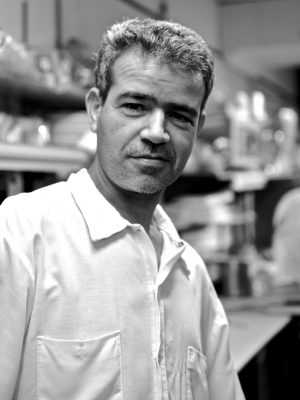
GOATS AND SCORPIONS
El Kabouss, 46, grew up in Arizon with his mom, dad, eight brothers and sisters and 200 other residents. Once a week his family would slaughter a goat so they could sell it at the market and buy essentials for the week: coffee, sugar, tea, etc.
People live in simple mud huts and are very poor, but they don’t need much to be happy, El Kabouss explains. As long as they have food and shelter, they’re content.
That doesn’t mean life in Arizon doesn’t have its problems.
“No hospitals, not very clean, no good,” El Kabouss says. “It’s very hard.”
It’s a poor community and the nearest hospital was seven hours away in Casablanca, making village life perilous. Danger lies beneath the sand in the form of snakes and scorpions.
There are no doctors in Arizon, so snake and scorpion bites are a worst-case scenario.
“Lots of people die from snakes and scorpions,” El Kabouss says.
El Kabouss was stung by scorpions three times during his time in Morocco. But he was lucky enough to reach medical help in time, a fortune many people in rural Morocco don’t find.
“I almost died from that shit, man,” El Kabouss says. El Kabouss moved from Arizon to Casablanca when he was just 11 years old to start working to send money back home. He worked as a waiter in a hotel cafeteria in Casablanca for 10 years and moonlighted as a chauffeur. He lived with the families he worked with while he lived in Casablanca.
But he was only making $300 or $400 a month and that’s when he decided to come to America. He needed to make more money to support himself and his village.
“I don’t have any fun if I don’t make any cash,” El Kabouss says.
JOURNEY TO AMERICA
Before coming to America, El Kabouss visited spots all over the world: London, Sweden, France and Denmark to name a few.
“I like to travel, dude,” El Kabouss says. “You just put credit card in pocket and fucking fly.”
After a quick stop in New York City, Ahmed flew to Washington and made his way to Ellensburg. He originally found out about Ellensburg when he befriended residents who coincidentally stayed at the hotel he was working at in Morocco.
When El Kabouss got to Ellensburg, he didn’t speak “a lick of English,” Hansen said. Hansen met El Kabouss through a family friend, and originally hired him to do yard work. As he picked up English, he got a positon as a dishwasher in 2000, and eventually started cooking around 2002.
“He learned English quick,” Hansen recalls. “He picked it up in months.”
El Kabouss has lived in Ellensburg his entire time in America, and The Palace is the only place he has worked. Since being in Ellensburg, he met his current wife Nazha, and lives with her and their two young children. Nazha was already an American citizen when they married, which allowed him to become an American citizen within two years.
CAPPING THE DAY OFF
At the end of the Sunday morning shift, El Kabouss retires to the bar in the back of The Palace with a handful of co-workers. They all crowd the same side of the bar and chat with the bartender as she fills the container with limes.
El Kabouss is the last of the group to show up. When it’s busy, he helps the dishwashers catch up. It isn’t required by any means, but when he sees work to be done, he’ll spend a few extra minutes to help. It’s easy to see how he picked up English so quick with that kind of work ethic.
“More rocket fuel, beautiful,” El Kabouss asks the bartender. She giggles and pours him another round. El Kabouss sips on the amber liquid.
He adds more ice from a larger glass and sloshes it around, the whiskey’s woody aroma wafting from the drink. He watches YouTube videos on his phone.
“It was a fuckin’ hard day,” El Kabouss laments as he sips his drink.
Sunday morning shifts at The Palace are intense. It isn’t uncommon for groups of 20 or more to come eat breakfast.
After-shift drinks with his co-workers are a welcome ritual after long days. El Kabouss giggles and shows me his phone.
“You see this?” he asks, smiling from ear to ear.
He shows me 30 seconds of what can only be described as a “pornographic ATM machine.”
Laughing hysterically, I ask our co-workers if they’ve seen the video.
“Oh yeah he sent me that,” Juan says, shaking his head.
“Me too,” Holly adds, rolling her eyes.
El Kabouss sends videos like this to all his friends – men, women, it doesn’t matter. Doesn’t matter if it’s questionable, doesn’t matter if it’s appropriate. If he thinks it’s funny, and you’re in his contact list, you might just watch it too.
Lately, the world seems more divided than ever. Humor can be a great equalizer. No matter where you’re born, or what your gender, dick jokes often get a laugh.
Sense of humor, hard work and altruism aren’t mutually exclusive, and El Kabouss is proof of it.



